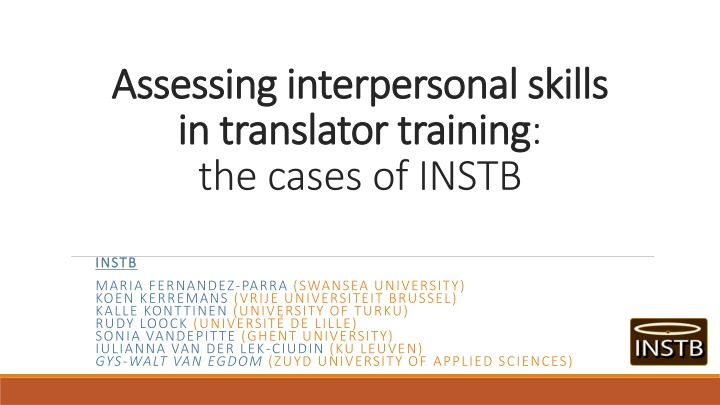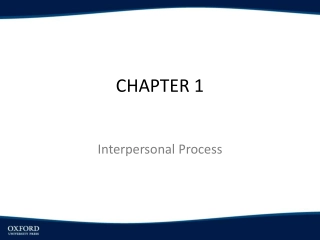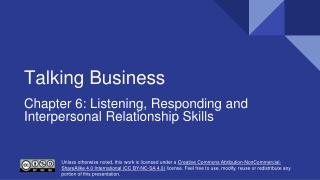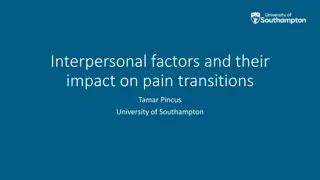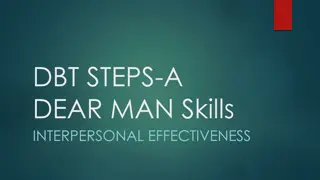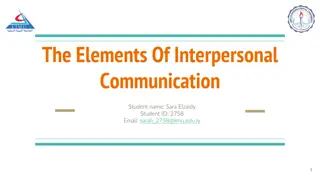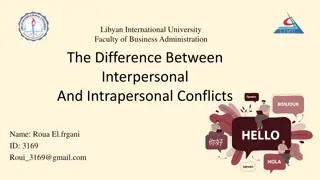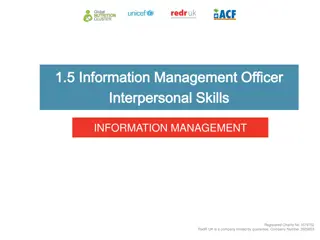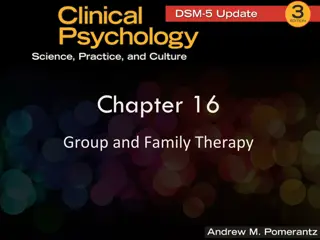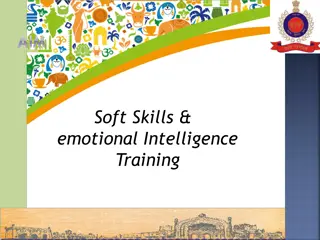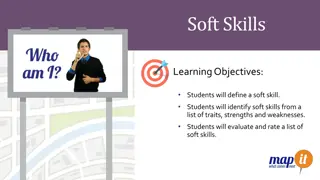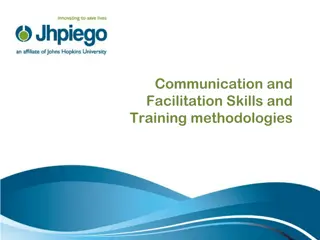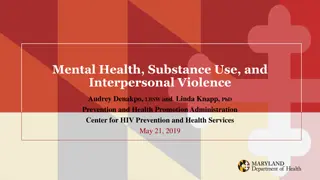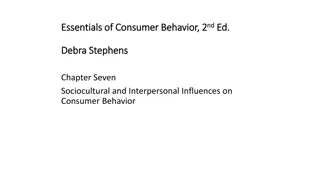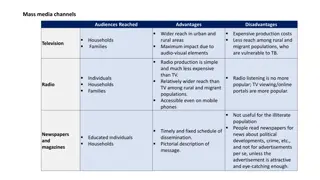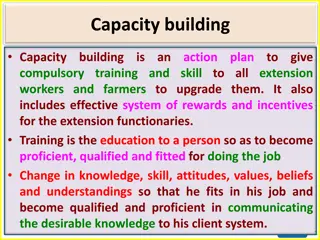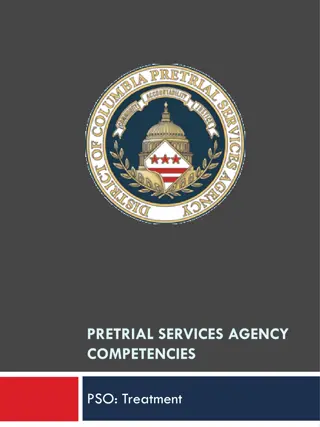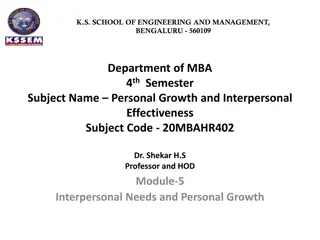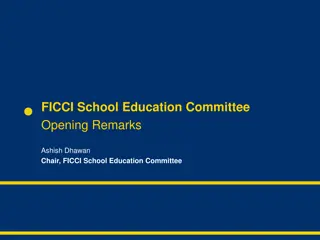Assessing Interpersonal Skills in Translator Training at INSTB
Translator training at INSTB focuses on integrating beginning professionals into the labor market with a special emphasis on employability. The program goes beyond theoretical discussions to tackle real-world translation challenges. Coordinated initiatives like OPTIMALE and funding from Erasmus Academic Network have further enhanced the market-oriented approach of the training.
Download Presentation

Please find below an Image/Link to download the presentation.
The content on the website is provided AS IS for your information and personal use only. It may not be sold, licensed, or shared on other websites without obtaining consent from the author.If you encounter any issues during the download, it is possible that the publisher has removed the file from their server.
You are allowed to download the files provided on this website for personal or commercial use, subject to the condition that they are used lawfully. All files are the property of their respective owners.
The content on the website is provided AS IS for your information and personal use only. It may not be sold, licensed, or shared on other websites without obtaining consent from the author.
E N D
Presentation Transcript
Assessing interpersonal skills Assessing interpersonal skills in translator training in translator training: the cases of INSTB INSTB INSTB MARIA FERNANDEZ-PARRA (SWANSEA UNIVERSITY) KOEN KERREMANS (VRIJE UNIVERSITEIT BRUSSEL) KALLE KONTTINEN (UNIVERSITY OF TURKU) RUDY LOOCK (UNIVERSIT DE LILLE) SONIA VANDEPITTE (GHENT UNIVERSITY) IULIANNA VAN DER LEK-CIUDIN (KU LEUVEN) GYS-WALT VAN EGDOM (ZUYD UNIVERSITY OF APPLIED SCIENCES)
Overview General context: translator training INSTB Research aims and rationale Research design Some results Conclusion and next steps
General General context context: Present-daytranslatortraining More than theorizing about translation More than "let's translate" Focus on integration of beginning professionals in the labour market ("employability) Especially since the introduction of the EMT (2009) European Master's in Translation
General context General context: Present-daytranslatortraining
General context General context: Present-daytranslatortraining
General context (see INSTB, forthcoming) Information mining courses & introductions to CAT, MT, corpora, etc. Authentic source texts LABOUR MARKET INTEGRATION Traineeships Realistic translation brief Lectures with information on the translation market Simulated translation bureaus / skills labs
General context Initiatives at various individual universities Co-ordinated initiatives: OPTIMALE (2010-2014) (Optimising Professional Translator Training in a Multilingual Europe) Erasmus Academic Network 70 partners from 32 different European countries promoting market-oriented translator training. funded OTCT / Tradutech (2014-2016)funded 7 partner universities organized five-day sessions during which students set up fictitious translation companies + carried out multilingual translation projects according to the specifications and deadlines set by their clients . INSTB (Official launch in 2015) not funded
INSTB (http://www.instb.eu) International Network of Simulated Translation Bureaus (since 2015) Share good practice in organizing/implementing skills labs Collaborate on projects (e.g. translation revision) What? Advantages? Teams of students work on an authentic task for a real or fictitious client under mock- realistic circumstances Combines all the required skills Learning by doing
Research aims and rationale Research aims: To develop and test a survey instrument for measuring student self-assessments in two competence areas: EMT competences Soft skills / transferrable skills / entrepreneurial competence To develop research designs for studies on the impact of simulated translation bureau pedagogy: Pre-post comparisons of student self-assessments within a university course. Pre-post comparisons between courses at different universities. To formulate and test specific hypotheses: e.g. soft skills, and more specifically interpersonal skills, are cultivated through authentic experiential learning? Rationale: Importance of transversal or soft skills in competency framework (EMT) Towards a self-evaluation tool for INSTB courses Identification of local (self-evaluated) initial competence levels in various areas: soft skills, work skills Identification of specific strengths in local initial competence levels and especially in local simulated translation bureau setups
Research design Categories CREATIVITY SKILLS INTERPERSONAL SKILLS TIME MANAGEMENT SKILLS TEAM WORK SKILLS WORK/INTERPERSONAL WORK/MANAGEMENT WORK/PRODUCTION WORK/SERVICE PROVISION WORK/SUPPORT WORK/TECHNOLOGY Dependent variables: Answers to 100 survey questions on a Likert scale (1 4), 0 as the value for I don't know, measured at the ordinal level. Independent variables: background questions measured at the nominal level, except for age (measured at the continuous level).
Research design Start of the STB course End of the STB course Pre-test Post-test Population (n= 254 for both pre- and post-tests) Between-groups comparisons: comparisons of average pre-test and post-test scores and distributions between universities Within-groups comparisons: comparisons of average pre-test and post-test scores and distributions within each university
Some results, before and after the STB KU / Leuven / Campus Antwerp, N= 10; 11 University of Lille, N= 40; 39 University of Turku, N= 18; 19 Zuyd Hogeschool, N= 30; 26 Additional data from Universiteit Gent (N=40), University of Exeter (N=4) and Vrije Universiteit Brussel (N=26)
ALL INSTB DATA IN PRE-POST COMPARISON Time management Team work skills Interpersonal skills Creativity Work skills 2.83 2.80 2.69 2.64 2.66 PRE (N=142) 2.95 2.88 2.81 2.70 2.85 POST (N=121)
PRE-POST CHANGE IN ALL SKILLS AREAS Time management Team work skills IC Creativity Work skills KU LEUVEN / CAMPUS ANTWERP PRE 2.89 2.94 2.75 2.66 2.72 KU LEUVEN / CAMPUS ANTWERP POST 2.93 2.92 2.80 2.72 2.86 UNIVERSITY OF LILLE PRE 2.93 2.82 2.72 2.77 2.72 UNIVERSITY OF LILLE POST 2.98 2.90 2.82 2.74 2.82 UNIVERSITY OF TURKU PRE 2.85 2.78 2.65 2.57 2.66 UNIVERSITY OF TURKU POST 2.95 2.91 2.80 2.70 3.03 ZUYD HOGESCHOOL PRE 2.80 2.81 2.71 2.66 2.75 ZUYD HOGESCHOOL POST 2.87 2.83 2.81 2.69 2.85
ZUYD HOGESCHOOL GROUP COMPARISON Time management Team work skills IC Creativity Work skills 2.81 2.80 2.76 2.69 2.71 ZUYD HOGESCHOOL GROUP 1 PRE 2.81 2.81 2.75 2.65 2.76 ZUYD HOGESCHOOL GROUP 1 POST 2.79 2.82 2.65 2.63 2.80 ZUYD HOGESCHOOL GROUP 2 PRE 2.93 2.85 2.86 2.72 2.93 ZUYD HOGESCHOOL GROUP 2 POST
TOP 5 IN PRE-POST DIFFERENCE OF MEANS 0.00 0.10 0.20 0.30 0.40 0.50 88 WOR/SERVICEPROV: I can analyse any type of (translation-related) project. 0.46 0.42 34 WOR/SUPPORT: I am able to work as IT support in a translation project. 93 WOR/SERVICEPROV: I know how to calculate the gross margin of a project. 0.36 26 WOR/MANAGE: I am able to assess the workload of a translation project and to schedule the project. 0.27 0.27 75 TMS: I set myself specific and clearly defined goals.
TOP 5 'SOFT SKILLS' IN PRE-POST DIFFERENCE OF MEANS 0.27 75 TMS: I set myself specific and clearly defined goals. 10 IC: I collaborate with others to solve problems using a variety of problem solving tools and techniques. 0.26 0.19 13 IC: I pay attention to other people's body language. 0.18 66 TWS: I am more concerned with major issues than with details. 0.17 62 TWS: I support and praise other team members.
Conclusion and next steps Conclusion Overall: skills honed through AEL (especially service provision skills and generic managerial skills) Minor observation: results of Zuyd case places emphasis on coaching (striking a balance) Limitation: in/through the eyes of students (self-assessment) Next steps Reducing the number of variables (questions) in order to make the survey a handy self- evaluation tool for simulated translation courses Grouping survey questions into principal components based on their correlations Expected result: an improved self-assessment survey with 40 50 questions, or a set of surveys for different purposes, divided into soft skills, work skills on the basis of correlations in the pilot study.
Thank you! www.instb.eu Or Joop.bindels@zuyd.nl Gijs-walt.vanegdom@zuyd.nl
